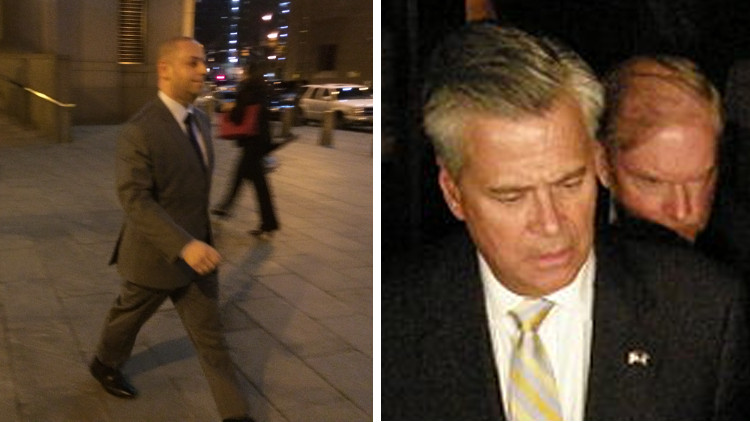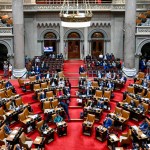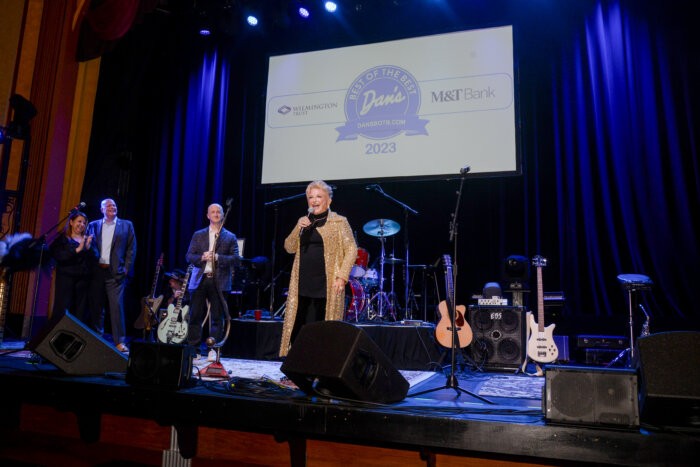New York State Sen. Dean Skelos (R-Rockville Centre) and his son were alternately characterized as extortionists and victims of overzealous investigators when prosecutors and defense attorneys gave summations in their corruption trial.
Prosecutors used the closing arguments to tie up loose ends in their narrative of the alleged conspiracy in which they said the senator coaxed no-show jobs and payments to his son, Adam, from companies that needed his legislative help. Defense attorneys sought to poke holes in the prosecution’s theories, questioned the credibility of key witnesses and characterized their clients as having a normal father-son relationship—points prosecutors later rebutted.
“The defendants knew exactly what they were doing,” Jason Masimore, assistant U.S. Attorney for the Southern District of New York, told the jury at Manhattan federal court while likening the former state Senate Majority Leader’s intimidation of companies reliant on him to the child who gets his way by bringing a giant gorilla to school in the popular children’s book, Where The Sidewalk Ends.
Both the senator and his son, Adam, pleaded not guilty to charges of extorting bribes in exchange for legislative favors from Roslyn-based Physicians’ Reciprocal Insurers (PRI), New Hyde Park-based Glenwood Management and Arizona-based AbTech Industries.
“The case has not been proven,” said the senator’s attorney, Robert Gage, who reiterated that his client never changed his position on a bill in exchange for anything. He repeatedly said, “There’s no quid pro quo.”
While Gage and Adam’s attorney, Christopher Conniff, questioned the motives of the four witnesses who signed non-prosecution agreements to get a pass on crimes they may have committed in exchange for their testimony, both lawyers focused on Charles Durego, general counsel at Glenwood. Conniff said Durego is “exaggerating” how much pressure the senator and his son put on Glenwood to get work for Adam. Gage said Durego “knows how to press levers.”
Conniff also said that prosecutors tried to make the jury not like Adam by using evidence that cast him in an unflattering light, such as testimony that the son cursed out and threatened to bash in the head of his boss at PRI when the boss questioned him about why he wasn’t showing up to work. Being a bad employee isn’t a crime, Conniff noted.
When it was the prosecution’s turn to rebut the defense attorney’s closing arguments, Masimore countered that the defense had tried to play on the jury’s emotions by casting the senator as a loving father simply helping his down-on-his-luck son. The federal prosecutor also disputed defense assertions that the witness testimony was too similar by arguing that they all had endured the same thing.
“They experienced the Skelos shakedown playbook,” Masimore said. He listed the six “chapters” of the playbook as asking favors of businesses that lobbied the senator, making sure those businesses have money, asking for the favors while being lobbied, lying about how broke Adam is, making the companies think they got something for their money, and if they resist, getting mad “so they know they might have a problem in Albany.”
Once the closing arguments concluded, Judge Kimba Wood gave the jury their instructions on how to deliberate, but let the jurors go home before she finished. After the jury hears the remainder of the instructions Thursday, they are expected to begin deliberating.
-With additional reporting by Desiree D’iorio


























